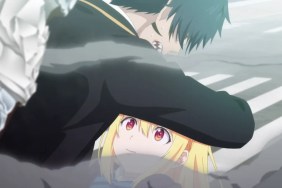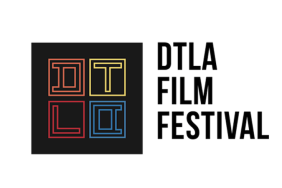Cast:
Jamel Debbouze as André
Rie Rasmussen as Angel-A
Gilbert Melki as Franck
Serge Riaboukine as Pedro
Akim Chir as Head of the Malfrats
Loïc Pora as Malfrat #2
Jérôme Guesdon as Malfrat #3
Eric Balliet as Franck’s Bodyguard
Venus Boone as Angela’s Mother
Michel Bellot as U.S. Planton
Olivier Claverie as U.S. Secretary
Michel Chesneau as Police Officer
Solange Milhaud as St. Lazare Woman
Laurent Jumeaucourt as Le Dragueur
Franck-Olivier Bonnet as Last Client
Directed by Luc Besson
Summary:
A departure from Luc Besson’s previous body of work, but more of a personal love letter to Paris that shows a great deal of maturity as a filmmaker and as a human.
Story:
André (Jamel Debbouze), a two-bit loser who has become massively in-debt to a number of bookies and gangsters, is about to give up hope when he’s distracted from his suicide attempt by a gorgeous blond named Angela (Rie Rasmussen) who puts herself at his beck and call in order to help him get out of his problems.
Analysis:
Fans of French filmmaker Luc Besson’s action-packed popcorn flicks might not completely get “Angel-A,” a throwback to European art films that allows Besson to explore his artier French roots. Shot completely in black and white, it probably wasn’t meant to amass the type of mainstream commercial success of Besson’s numerous franchises, but it’s not exactly a small movie either. It mostly involves two characters, but it incorporates the streets and rivers of Paris to create a far more vast scope than one might expect.
Jamel Debbouze, best remembered as the grocer’s assistant in “Amelie,” plays André, a down-on-his-luck hustler whose gambling debts have finally caught up with him. First, one group of gangsters roughs him up, followed by him being suspended off the Eiffel Tower by another goon, and he’s given a deadline to get them an exorbitant amount of money. After trying to get himself protection, André throws in the towel, but as he’s about to jump off a bridge, he sees a beautiful young woman with the same idea, and he instead decides to save her. Towering over André, the woman Angela is as beautiful as he is ugly, and to repay him for saving her life, she agrees to stay by his side and do anything he wants. She proves more than Andre bargained for, getting him into more trouble with a gangster named Franck (played by the always excellent Gilbert Melki), but she eventually reveals that she’s André’s guardian angel on a mission to try to help improve his life.
“Angel-A” takes Besson away from his genre roots, being more of a character piece than his last few films, but entertainment factor remains high due to the performances by its two leads. Danish model-artist Rie Rasmussen is quite glorious in her first major role, her beauty and sexiness often overshadowing that of Paris itself. Her erratic behavior makes her as much an enigma to the viewer as to André, who doesn’t know what to make of the beautiful woman who seems willing to sell herself to the men she meets in a nighclub in order to earn money to pay off André’s debts. As easily as Rie keeps male eyes glued to the screen with her sexy antics, this is an equally strong role for Jamel Dabbouze, a French comedian who’s mainly played supporting and ensemble parts, but who seems just as comfortable with the dramatic aspects of the character as the humor inherent in André trying to avoid being caught by the people to whom he owes money.
As his most dialogue-driven film to date, Besson uses these characters to explore all sorts of philosophical ideas about how to live life and find love, and he couldn’t find a better backdrop than Paris, as gorgeously captured in black and white by Besson’s long-time cinematographer Thierry Arbogast. The awkward pseudo love story that plays out on this stage might easily be compared to Zach Braff’s “Garden State” or Jim Carney’s recent “Once” in that it’s just as much about the location as it is about the two characters.
After all of her troublemaking, it’s pretty obvious that Angela isn’t your normal woman, so it isn’t too big a surprise when she reveals her identity as an angel to André. This new fact adds another dynamic to the story, even as it also leads to a number of outlandish moments, like when Angela single-handedly takes out a bunch of thugs sent to get the money André owes. It’s a funny moment that takes you by surprise, but also a good example of the film’s tonal issues, being serious and emotional one moment and silly the next. Just as you get used to one shift, it changes tone, ultimately winding up with a strange ending that’s made worse by a bit of histrionics from Rasmussen, who’s fun to watch as Angela vamps it up, but isn’t as convincing in the dramatic moments. The premise also sends out rather strange mixed messages, because Angela is supposed to represent this strong female entity, but she’s still very much a male image of the perfect woman, a sex kitten who’s up for anything at any time. This probably won’t bother many guys, but it might not go over as well with their dates.
The Bottom Line:
“Angel-A” doesn’t offer as much instant gratification as Besson’s more action-packed flicks, nor is it quite on par with other quirky romances, but it’s clearly Besson’s most personal film, a gorgeous and romantic travelogue of Paris locations, the type of foreign film that offers romance for the ladies, action for the guys, and plenty of humorous and poignant moments that can be admired by both.










